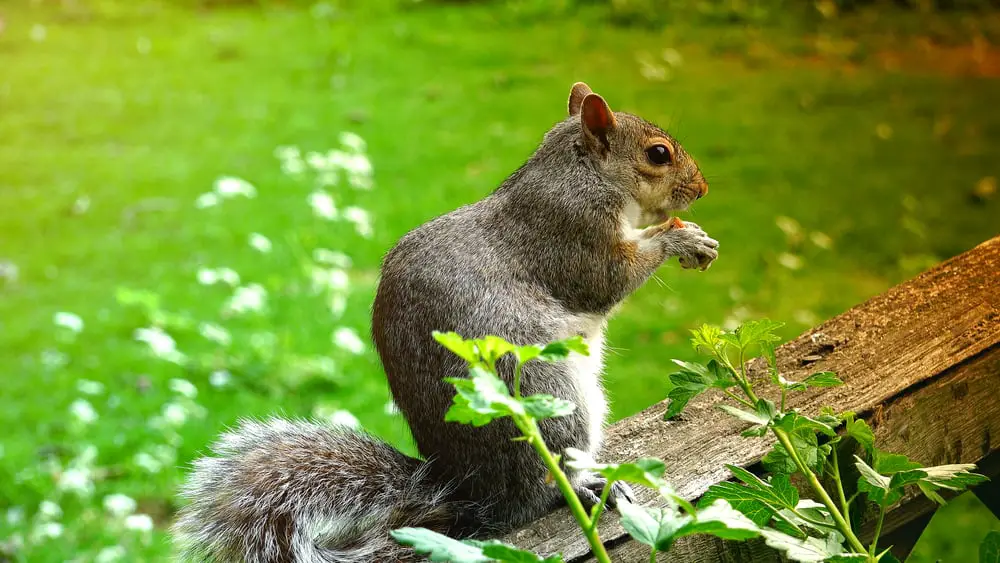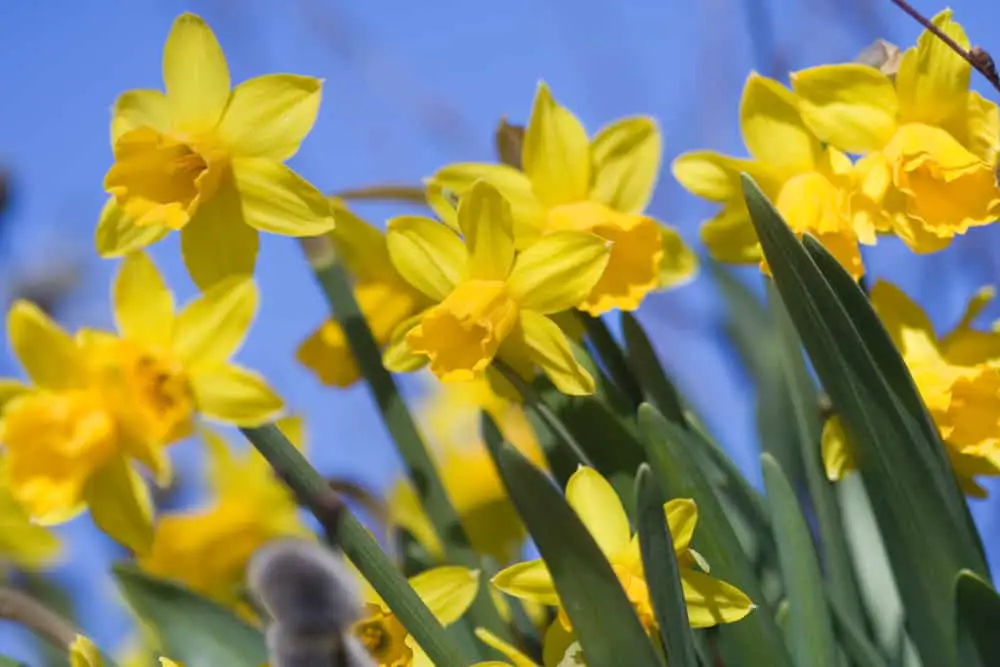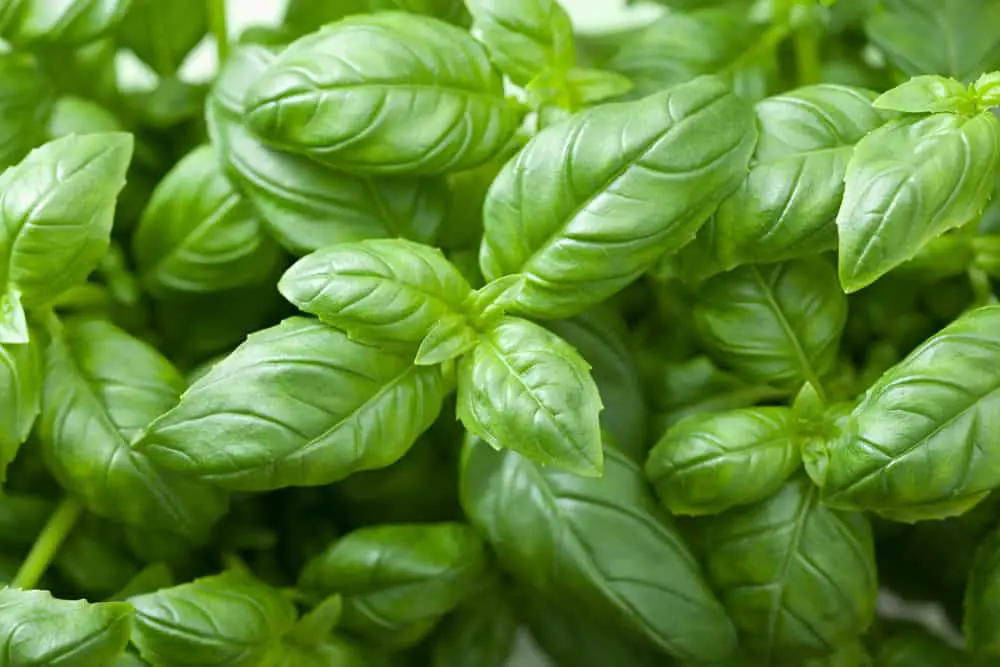I learned long ago that trying to keep squirrels off my property was a hopeless endeavor. Once I stopped trying to completely keep them out, I was free to observe the squirrels to see where they spent most of their time.
Besides time spent playing on the trees and raiding the bird feeders for seeds, most of the squirrels preferred hanging around the herb gardens. I quickly realized that the scents of the herbs attracted the squirrels, and they would eat some types but leave others completely untouched.
Will Squirrels Eat Basil?
Both ground squirrels and tree squirrels will eat basil. Not only will they eat these leafy greens, but the strong aroma of basil actually attracts them. Each squirrel seems to have a preference for which part of the herb and how much of it they will eat.
Hungry squirrels can pick your garden clean of vegetables like tomatoes and herbs like basil and dill. The strong smell and large seeds of basil plants have flavors that squirrels can’t seem to get enough of as well as plenty of the essential vitamins a growing rodent needs.
Ways to Protect Herb Garden Safe from Squirrels?
Since squirrels are attracted to basil plants so strongly, it may be necessary to keep them out of your garden. Like with other animals that invade our gardens, chicken wire, squirrel repellents, and natural predators can be used by gardeners to keep squirrels out and save their extra tomatoes from damage.
Barriers
There are many obstacles that can be placed between your herb garden and wild animals that keep squirrels at bay. While blocking your whole yard off from rodents and pests is impossible, separating a small area like an herb garden is much easier.
Wire mesh screens and chicken wire can be used to enclose herb gardens. Make sure there is space for the plants to grow to full size without hitting the sides of the mesh. Squirrels will grab leaves and seeds if they can reach them as they pass by.
Other Barriers like smooth surfaces squirrels cannot climb, or a small greenhouse can also be used. This prevents the squirrels from smelling the basil as strongly and stops them from reaching in and helping themselves through the mesh.
Repellents
There are many ways to repel squirrels from your herb garden and vegetable plants. There are smells like peppermint oil and cinnamon that they dislike. Placing plants like mint and cayenne pepper around herbs like basil and dill can work as natural repellents.
Squirrel-proof bird feeders can help keep birds and squirrels separate and prevent sunflower seeds from spreading everywhere. Reducing the temptation of fresh water and bird food can discourage squirrels from entering your yard and garden.
Motion-activated lights can help scare off squirrels in the early morning and dusk. The unexpected light can be enough to startle them away. This has the added benefit of scaring off nocturnal forages like flying squirrels and skunks.
Sprinklers and water systems can also be motion-activated to come on when squirrels enter the yard. This spray will send all but the most stubborn of animals running for safety and protect your vulnerable vegetables and herbs. The list of animals this method of garden protection works on is extensive.
Natural Predators
Gardeners and their pests make good natural predators and will keep squirrels out of the garden while they are around. Once the gardeners are gone, the squirrels leave their natural habitat and come back and look for a snack of tasty basil leaf.
Having an environment that cultivates natural predators like raptors and cats to keep the squirrel population in check is also a good way to keep your herb garden safe. Most predators of squirrels have little interest in your herb garden unless you have catnip growing there.
Do Squirrels Eat All Types of Basil?

There are hundreds of types of basil, but only a select few are commonly grown in home gardens. The common type of basil grown is done for their culinary applications, healing, and spiritual uses.
Although we enjoy a range of basils for various reasons, they come in many smells and flavors, and every basil leaf might not be for every squirrel. Squirrels are picky eaters, and below is a list of basil herbs they like and dislike.
- Greek Basil – Due to the sweet taste and strong aromatics, squirrels will always tear apart this type of basil. Its small leaves are perfect for a quick snack and even sweeter than sweet basil.
- Genovese Basil – This is one of the favorite types of basil for squirrels. As it is one of the most popular varieties grown, squirrels must have grown used to this sweet basil. The leaves can grow large, and the seeds put up at maturity are full of flavor and antioxidant properties.
- Thai Basil – This basil is less flavorful and aromatic than the previous two types. It is grown for its holistic healing properties and features heavily in Thai and South East Asian Cuisine. Squirrels are not drawn to this basil as much as the others but would probably eat it if they were hungry and had limited options.
- Opal Basil – This basil has a dark color and a lemon-lime taste. The smell is not overpowering and is unlikely to attract pests. Squirrels most likely would not be interested in the citrus flavors of this basil and would choose other more palatable herbs instead.
- Lemon Basil – Another basil plant with a citrus flavor. Lemon basil has a strong smell but acts more as a repellent than an attractant. Insects and rodents often avoid lemon basil and other plants with these properties.
- Cinnamon Basil – As the name suggests, this basis has a spice and kick that is reminiscent of cinnamon. The spicy smell and taste will surely disturb squirrels and other pests unwary enough to take a bite. This is a great plant to grow in your garden to repel unwanted critters.
Are Herbs Safe for Squirrels?
Herbs act as magnets and attract rodents to your garden. They can bring squirrels into your yard at all times of day, and when other food sources are scarce, squirrels can wipe out your whole garden.
Herbs squirrels dislike can keep them far away from where you don’t want them. The taste and smell of select plants are enough to drive them out and keep them from wandering back for many weeks. Understanding which herbs squirrels like and dislike can help you plan your garden effectively.
| Safe | UnSafe | Liked | Disliked |
| Parsley | Lavender | Dill | Rosemary |
| Basil | Daffodils | Cilantro | Mint |
| Watercress | Alliums | Thyme | Peppermint |
Safe Herbs
These are herbs that squirrels can eat regularly in a moderate amount. Too much of any food source can lead to stomach problems for squirrels, but these herbs are generally safe for rodents to dine on.
- Parsley – This common garden herb grows abundantly in much of the world. It can be given to squirrels anytime you trim or harvest and will help give them essential nutrients and minerals.
- Basil – Truly a favorite of the squirrel; its sweet taste and strong smell draw them in. Plant wild basil around the edge of your yard and let it take off. This should keep the squirrels happy and away from your vegetables.
- Watercress- Since these are usually planted in small water features, squirrels get to enjoy this delicious plant while also getting hydrated. The small leaves and ease of eating make it a favorite for squirrels on the lookout for predators.
Unsafe Herbs

These are herbs that squirrels will typically avoid. If you are in the habit of cutting leaves to feed the squirrels, do not add these, as they could cause health problems.
- Lavender – Something in the flowers of this plant is undigestable to squirrels. They are aware of this and will not eat it in nature. If you are feeding squirrels or have pet squirrels, do not include any parts of the lavender plant.
- Daffodils – The flowers and leaves of daffodils have flavors and chemicals that are offensive to squirrels. They will not eat these flowers in an herb garden.
- Alliums – Often grown to keep insects and bugs out of gardens, they have a similar effect on rodents. These herbs’ smells and strong taste can keep your garden free of pests.
Liked
These are the herbs that a squirrel enjoys eating or lounging near. Whatever the taste or smell, some chemical in these herbs draws squirrels back repeatedly.
- Dill – In the same family as parsley, this is also an herb squirrels love. The rich smell of dill and the tiny leaves are delicious and easily eaten on the run. Squirrels like the fresh taste and vitamin A provided by fresh dill leaves.
- Cilantro – This herb produces giant seeds and has a very strong smell. The slightly peppery taste of the leaves doesn’t seem to deter squirrels; they frequently collect coriander seeds at the end of summer.
- Thyme – Very strong smell and a pleasing flavor for rodents. Squirrels love to dig into these plants and pull out the whole stalk. They will eat at the leaves and roots whenever they can.
Disliked
- Rosemary – The strong aroma of rosemary seems to deter squirrels. The prickly nature of the branches and the overall dryness of the plant leave much to be desired. It is clear why it is a garnish, not a salad herb. The squirrels agree.
- Mint – The strong flavor and smell of mint seem to stop squirrels dead in their tracks. Much like coffee, the smell of mint can mask other odors and present potential danger for squirrels.
- Peppermint – The smell of peppermint repels bugs and most pests. It is strong and lingers and burns the sensitive noses of smell dominate mammals. This is a great plant to deter animals away from other valuable plants in your garden.


